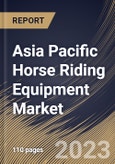The Australian Government, in conjunction with the Australian Sports Commission (ASC), invested $340 million in Australian Olympians in order to provide the necessary support for the Rio Olympics. These various initiatives and increases in investments by multiple governments are resulting in increased participation in various sports activities by young people, which in turn bolsters the demand for horse riding equipment.
As much as performance in the sport itself, fashion has been the focal point of the flourishing horse riding equipment industry. Brands such as U.S. Polo have dominated the equestrian riding fashion scene for decades. The company has become synonymous with sport through its T-shirts, team uniforms, boots, and other merchandise.
New market entrants, such as Decathlon, who offer equipment at significantly lower prices, uncompromised quality, and in line with the most recent fashion trends, have attracted a greater number of consumers, thereby intensifying competition. As a result of technological advancements, equestrian fashion incorporates fabrics that are resistant to dirt and precipitation and provide enhanced grip. Better cuts for enhanced mobility and increased safety function of helmets, as well as the utmost comfort, have aided the market success of helmet manufacturers.
The emergence of equestrian tourism destinations, particularly in countries like Australia and New Zealand, has also played a role in stimulating the market. Tourists and locals alike seek unique horseback riding experiences, driving the need for well-maintained riding gear. Moreover, a growing awareness of the physical and mental health benefits of horseback riding has made it an attractive choice for individuals looking for an active and therapeutic lifestyle. As a result, the Asia Pacific market is experiencing robust growth, with manufacturers and retailers continuously innovating to meet the evolving demands of this burgeoning market segment.
The China market dominated the Asia Pacific Horse Riding Equipment Market by Country in 2022, and would continue to be a dominant market till 2030; thereby, achieving a market value of $207 million by 2030. The Japan market is registering a CAGR of 3.5% during (2023-2030). Additionally, India's market would showcase a CAGR of 4.8% during (2023-2030).
Based on Sales Channel, the market is segmented into Sports Retail Chain, Hypermarket and Supermarket, Independent Sports Outlet, and Others. Based on Gender, the market is segmented into Male, and Female. Based on Type, the market is segmented into Helmets, Vests, Stirrup, and Others. Based on countries, the market is segmented into China, Japan, India, South Korea, Singapore, Malaysia, and Rest of Asia Pacific.
The market research report covers the analysis of key stake holders of the market. Key companies profiled in the report include Decathlon S.A. (Asociacion Familiale Mulliez) (Oxelo), Ariat International, Inc., Dainese S.p. A, Colonial Saddlery, Fabtron, Inc., HKM Sports Equipment GmbH (Finatem investment company), CAVALLO Albert Sahle GmbH Co. KG, Mountain Horse Int. AB, Antarès distribution, and Georg Kieffer Sattlerwarenfabrik GmbH.
Scope of the Study
By Sales Channel
- Sports Retail Chain
- Hypermarket and Supermarket
- Independent Sports Outlet
- Others
By Gender
- Male
- Female
By Type
- Helmets
- Vests
- Stirrup
- Others
By Country
- China
- Japan
- India
- South Korea
- Singapore
- Malaysia
- Rest of Asia Pacific
Key Market Players
List of Companies Profiled in the Report:
- Decathlon S.A. (Asociacion Familiale Mulliez) (Oxelo)
- Ariat International, Inc.
- Dainese S.p. A
- Colonial Saddlery
- Fabtron, Inc.
- HKM Sports Equipment GmbH (Finatem investment company)
- CAVALLO Albert Sahle GmbH Co. KG
- Mountain Horse Int. AB
- Antarès distribution
- Georg Kieffer Sattlerwarenfabrik GmbH
Unique Offerings
- Exhaustive coverage
- The highest number of Market tables and figures
- Subscription-based model available
- Guaranteed best price
- Assured post sales research support with 10% customization free
Table of Contents
Companies Mentioned
- Decathlon S.A. (Asociacion Familiale Mulliez) (Oxelo)
- Ariat International, Inc.
- Dainese S.p.A
- Colonial Saddlery
- Fabtron, Inc.
- HKM Sports Equipment GmbH (Finatem investment company)
- CAVALLO Albert Sahle GmbH Co. KG
- Mountain Horse Int. AB
- Antarès distribution
- Georg Kieffer Sattlerwarenfabrik GmbH








